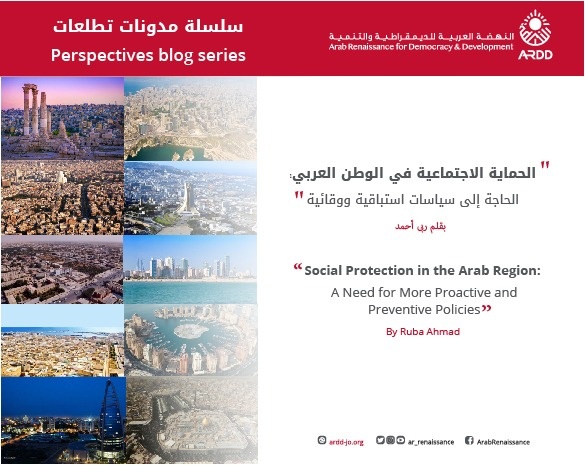As the COVID-19 pandemic has forced countries around the world to reflect on inequalities and vulnerabilities within the context of a global health crisis, countries in the Arab world have taken various public health measures with the aim of controlling the spread of the virus. These have had, much like in contexts around the world, adverse impacts in varying degrees and on various communities.
While recognizing the long-term negative repercussions of this pandemic, how can this moment be used for critical self-reflection in terms of social protection?
A look in the mirror
It is evident that at the core of crises lies an amalgamation of factors including the political, environmental, social, and economic factors. The Coronavirus pandemic is no exception as it has everything to do with the development and enhancement of the economic and social model in the Arab world – or lack thereof. Through this intersectionality, many have come to the realisation that the time has come for defining social policies, pertaining to poverty, community development, and improving the quality of life for the public – particularly vulnerable populations such as the elderly, women, children, migrant workers and refugees.
Analysis of the Arab world is seemingly endless, especially with regard to protracted crises, but the Coronavirus one has unveiled the extent to which the foundational challenges in the Arab world have proliferated and continued to deepen. As discussed in ARDD’s Regional Dialogues on Social Protection in the Arab Region, these challenges include donor-dependent development, inefficient engagement of local actors, limited investment in scientific research, economic downfall and labour challenges – and many others. This has revived the debate about the relationship between the state and society in the Arab region. It has highlighted the need for radical reform and transformations in order to effectively combat poverty and create innovate policies that aim to enhance the development of labour, health, education, and social welfare. It has also become evident that this must take place alongside actively reinforcing the participation of people, governments, and civil society organizations in bringing about the desired reform.
From the perspective of strengthening the region’s reactive capacity, it is evident that this necessitates proper planning for disaster and crisis management as well as an investment in public services. However, in order to identify a proactive, efficient way forward, attention must be paid to ensuring the security of individuals and societies from a holistic perspective. It is necessary to reform institutional structures and systems to ensure the effectiveness of social protection policies. As it stands, the apparent fragility of existing protection systems and their lack of inclusiveness highlight a need for more attention to civil rights and human dignity through solidarity, rather than pity. Essentially, this requires ensuring people’s freedom from fear, freedom from want, and freedom from indignity – and placing the individual human being at the centre of the analysis.
A look around
With the deep gap that separates Arab societies from global standards of productivity and stability, social protection systems in the Arab world continue to decline or, some may argue, are deliberately absent. Possible points to consider in order to address this issue include committing to effective and participatory coordination efforts, investing in societal solidarity, and restoring confidence between countries and their citizens. This can be done, in part, by establishing comprehensive social protection and better ensuring the stability of communities, especially those of the middle and poor classes. More importantly, the path from the current state of social protection towards its development must move past the tendency of governments to work independentlyand guarantee the involvement of stakeholders such as the private sector, civil society, experts and researchers.It is precisely this collaborative framework that will broaden the scope of government services for individuals and create space for proactive, informed policy development.
This collaboration mustspecifically include measures aimed at achieving sustainable economies as well as measures to support and build long-term, proactive partnerships with the private sector.The private sector must be empowered to move past a ‘donor’ role and prioritise solidarity over profit margins, as well as guarantee labour standards and workers’ rights. Social policy research, in particular, is central to ripening public debate about the challenges faced at multiple levels within society, as well as analyzing and rationalizing the formulation of public policies and decision-making by providing evidence-based recommendations.This is also true for knowledge sharing and networking mechanisms, like the MENA Social Protection Network, which connect policy makers and academics towards the advancement of social policy.
A look ahead
In the spirit of good governance and active citizenship, various stakeholders in the Arab world must begin to truly commit to rejuvenating the social contract in order to recalibrate ‘business as usual’ towards proactive and preventativeaccountability and transparency. The complementarily between responsible citizenship and responsible governance is arguably more evident now than ever. Enhancing this complementarity will require investment in the administrative structures of social protection policies and mechanisms through people-centred initiatives that frame social protection within a rights-based framework.
In particular, there is a need for highlighting the importance of localization of humanitarian efforts, strengthening evidence-based partnerships, enhancing mutual respect and collaboration between stakeholders, and understanding the structural factors of inequality – and the way these factors relate to social protection.
The only thing that is certain at this stage is that the future of the Arab world, in a post-COVID-19 world, must be centred on rebuilding the concept of partnership among all actors in a way that can guarantee the preservation of the social rights of the Arab citizen.


